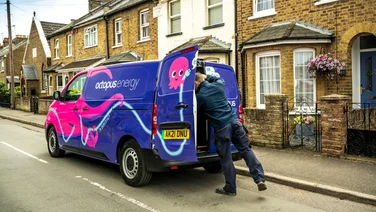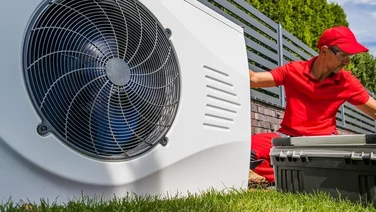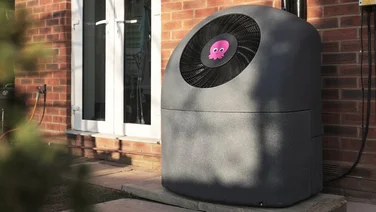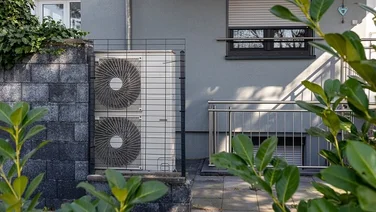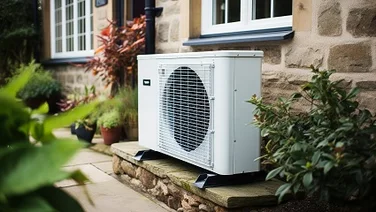- A 5kW air source heat pump will suit the average three-bed home
- If you have a large house, a 12kW or 16kW model is best
- Buying a heat pump will cut your carbon footprint by 44%, on average
Although heat pump costs can be high, they can also save you thousands of pounds on bills and tonnes of CO2 emissions, and reliably keep your home warm for the next 20 years.
Until 2027, the government’s Boiler Upgrade Scheme can cut your air source heat pump costs by £7,500.
You don’t just want any heat pump, though, you want the best heat pump, the one that will suit your home perfectly, and provide the greatest value for money, and we’ve got you covered.
And if you don’t want to wait to find out which heat pump would suit your home best, just use our custom-built tool.
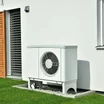
Get £7500 towards your heat pump installation through a trusted installer
An MCS-certified heat pump installer can apply for the Boiler Upgrade Scheme on your behalf, get a quote from one now
What size is a standard air source heat pump?

Air source heat pumps generally range from 5kW* to 16kW. The bigger your home, the higher the number of kilowatts you’ll need.
Typically, a 100m² property with three bedrooms will require a 5kW air source heat pump, while a 200m² home will need a 10kW machine.
A poorly insulated house that’s 250m² or bigger may require a 12kW or even 16kW system.
In terms of physical size, your new air source heat pump will generally stand between 1 and 1.5 metres high, and between 0.5 and 1 metre wide, meaning it’s roughly the size of a standard washing machine.
They usually weigh between 60 and 100kg, which is more or less the same as the average UK adult.
To find the right model for your home, check out our guide to the best air source heat pumps.
How to work out what size heat pump you need
If you have a new-build property, use the handy table below to get an idea of the typical size of air source heat pump for your home.
House size | Number of bedrooms | Air source heat pump size | Cost |
|---|---|---|---|
100m² | 3 | 5kW | £10,000 |
200m² | 4 | 10kW | £13,000 |
300m² | 5-6 | 16kW | £15,000 |
If your home isn’t completely new, you should get a heat pump company to provide you with a heat-loss assessment before they give you a quote for one of their products.
Even your local heat pump company should be in a position to offer such an assessment, too. They’ll perform a calculation based on the age of the property, its size, the number and size of its rooms and radiators, and whether it has single or double glazing.
The company will also check your insulation level and whether you’ve installed underfloor heating pipes.
If you have poor insulation and/or no underfloor system, you can still use a heat pump to warm your home – it’ll just need to be bigger to make up for these shortfalls. A poorly insulated property typically needs a heat pump 1.5 times the size of a well-insulated home.
That means a three-bedroom will need a 5kW heat pump, unless its insulation levels are low, in which case it’ll usually require a 7.5kW machine. Naturally, this will add to your initial costs.
For more information about how much you’ll pay, check out our guide to air source heat pump costs.

Get £7500 towards your heat pump installation through a trusted installer
An MCS-certified heat pump installer can apply for the Boiler Upgrade Scheme on your behalf, get a quote from one now
Why does heat pump size matter?
Buying an appropriately sized heat pump for your home will help you to avoid overpaying, and will allow you to maximise your savings.
The average three-bedroom house can save up to £4,000 over 20 years by getting an air source heat pump instead of a gas boiler – but that only applies to households that buy the right size.
If you pay the £13,000 that a larger system typically costs, this will eat into your savings.
An unnecessarily big heat pump will also run in short cycles, which is bad news for the machine’s motor, and may mean you have to replace the heat pump before its usual 20-year lifespan.
And if you get a heat pump that’s too small, it’ll run pretty much the whole time to try to fulfil your temperature needs – which will increase your heating bills.
How can you prepare your home for a heat pump?
It’s important to remember that your home is unique. As Octopus Energy says: “Every installation process is bespoke to each home.”
However, there are several general steps you can take to prepare for a heat pump. First turn the flow temperature of your boiler down to 50°C in winter, to see how your property copes.
If you don’t notice any negative effects, you’re ready for a heat pump, and don’t need to install any new insulation or radiators.
If you’re cold at 50°C, consider any of the following improvements to get your property ready for a heat pump:
Getting radiators 2.5 times bigger than the standard size is a good shortcut to preparing your property for a heat pump, and can even reduce the size of the heat pump you need.
This is because larger radiators can disperse the same amount of heat over a longer period of time, which suits heat pumps perfectly. For more information, read our guide to using air source heat pumps with your radiators.
Make sure you also have enough room outside to fit a heat pump – which most houses do – and identify a one metre by one metre space inside your home for a hot water cylinder.
Pros and cons of a large heat pump
- Can reliably heat your home in almost any weather
- More efficient
- You can use all the electricity your solar panels generate
- More eco-friendly
- Futureproof against future boiler bans
- More expensive than a smaller model
- Higher energy bills
- Requires more space
Heat pump running costs
A ground source heat pump’s running costs for a three-bedroom household will typically come to around £939 per year.
The average air source heat pump will cost about the same, though this can vary significantly, depending on where you live in the UK.
| Heating method | Efficiency (%) | Annual energy use (kWh) | Cost (p/kWh) | Annual bill |
|---|---|---|---|---|
| Gas boiler | 95 | 11,500 | 6.04 | £694 |
| Heat pump | 300 | 3,833 | 24.50 | £939 |
| Oil boiler | 92 | 11,875 | 11.14 | £1,337 |
| Electric boiler | 100 | 10,925 | 24.50 | £2,676 |
The best large heat pump on the market
The Grant Aerona³ R32 is the best large heat pump around, hands-down.
This 17kW air source model will comfortably heat practically any house with an incredible efficiency rating of 479% – meaning it creates 4.79 units of heat for every unit of electricity it absorbs.
At 120kg, it’s below average weight for its power, and you can even get a seven-year guarantee if it’s installed by one of Grant’s approved G1 tradespeople – though considering it works at temperatures as low as -20°C, it probably won’t let you down anyway.
The Aerona³ R32 can be picked up for an extremely reasonable £5,400, plus installation.
To see the other models we’ve chosen as our top picks this year, check out our guide to the best air source heat pumps.
The best small heat pump on the market
The 5kW edition of the Samsung R32 Monobloc air source heat pump is your best bet if you’re looking to heat a house of around 100m².
For a relatively low initial price of £3,500, you can get an efficiency rating of 485% – that is, 4.85 units of heat for every unit of electricity. Now that’s efficient.
Its sound level is just 45dB, which is equivalent to light rain, and it’s a small unit, weighing in at a svelte 58.5kg.
And its slight frame belies its durability, as it’s able to keep working even if the mercury drops to -25°C. It also comes with a seven-year warranty when set up by an approved installer.
Summary
- You’re now ready to begin saving money and energy with a new heat pump
- All you need to do is ask for a free heat loss assessment for your home, make any necessary improvements, and then purchase the perfect heat pump for you
- The government’s Boiler Upgrade Scheme, you could save £7,500 on a new heat pump – and reduce your emissions by 44%
- If you’re ready to get a heat pump, make sure you use our air source heat pump cost calculator to get an estimate


